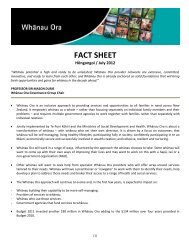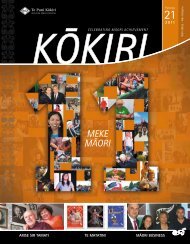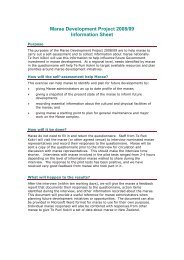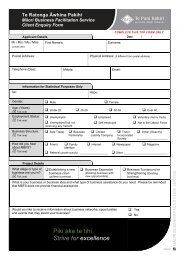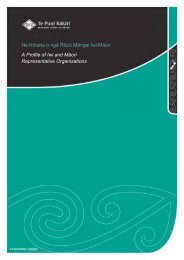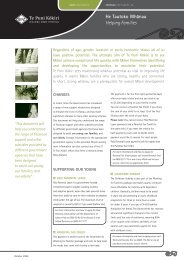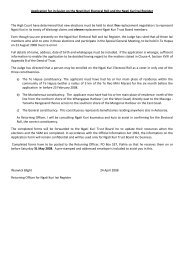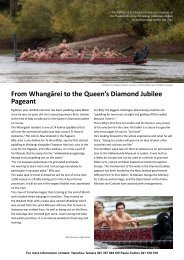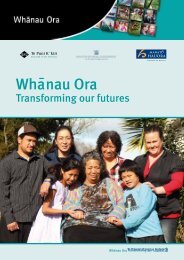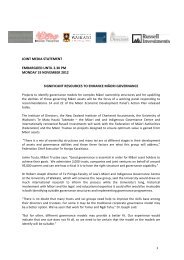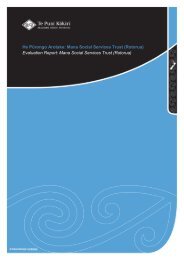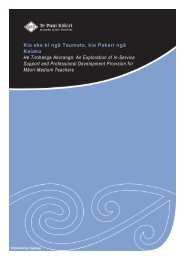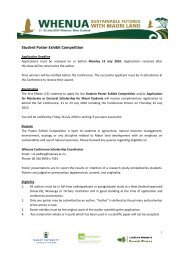Measuring performance and effectiveness for Mäori ... - Te Puni Kokiri
Measuring performance and effectiveness for Mäori ... - Te Puni Kokiri
Measuring performance and effectiveness for Mäori ... - Te Puni Kokiri
You also want an ePaper? Increase the reach of your titles
YUMPU automatically turns print PDFs into web optimized ePapers that Google loves.
New Zeal<strong>and</strong> (2002) explains that historically<br />
governments have had their own reasons<br />
to collect statistics on Mäori, <strong>and</strong> that<br />
this has meant that Mäori statistics have<br />
tended to meet specific government needs<br />
(concurring with Durie’s view), rather than<br />
overall development aspirations of Mäori.<br />
Mäori statistics tend to represent non-Mäori<br />
analytical frameworks <strong>and</strong> philosophical<br />
approaches, fail to represent Mäori realities,<br />
<strong>and</strong> are based on the underlying assumptions<br />
that some Mäori have questioned the<br />
relevance of that data.<br />
4.3 WELLBEING FOR THE<br />
INDIVIDUAL AND THE GROUP<br />
A key difference between Mäori writings <strong>and</strong><br />
the domestic <strong>and</strong> international literature is<br />
their emphasis on measuring wellbeing <strong>for</strong> not<br />
just the individual but the group. Durie has<br />
consistently argued that indicators should be<br />
able to capture both the individual <strong>and</strong> the<br />
group (see Durie, 2003c; Durie et al., 2005c).<br />
Durie (2003a) suggests that in order to promote<br />
positive Mäori participation in society as<br />
Mäori 6 <strong>and</strong> in Mäori society, Mäori-specific<br />
measures must include some measurement at<br />
a level wider than the individual; otherwise<br />
they will not adequately reflect a Mäori<br />
world view. Humpage (2002, pp.192-3) notes:<br />
“Key indicators of economic status such<br />
as…..employment……do not account <strong>for</strong> the<br />
collective economic status of whänau (extended<br />
family), hapu <strong>and</strong> iwi. Nor do they take note of<br />
the culturally significant relationships between<br />
individuals <strong>and</strong> hapu/iwi or other Mäori groups<br />
(Kawharu, 2001, pp.3-4)”.<br />
4.4 MEASURES CAPTURING<br />
WHÄNAU ADVANCEMENT<br />
Whänau – the foundation Mäori<br />
institution <strong>and</strong> most effective<br />
change agent<br />
Durie <strong>and</strong> several other Mäori academics<br />
(Durie, 2003a, 2003c, 2006; Durie, Fitzgerald,<br />
Kingi <strong>and</strong> Stevenson, 2003b; Durie et al.,<br />
2005c; Durie <strong>and</strong> Kingi, 2010) say that<br />
measuring the impact of a service on a client’s<br />
whänau is important because whänau is the<br />
foundation Mäori institution. Whänau has the<br />
potential to point its own members towards<br />
good outcomes in both the generic <strong>and</strong> Mäori<br />
sense. Whänau have also been identified as<br />
the most sustainable <strong>and</strong> effective agents of<br />
change <strong>for</strong> Mäori.<br />
The strength of using both individual<br />
<strong>and</strong> whänau measures<br />
Client <strong>and</strong> whänau impact measures (<strong>for</strong><br />
service delivery) should include three different<br />
perspectives of the impact or outcome<br />
achieved, those of: the client <strong>and</strong> service<br />
provider; <strong>and</strong> a member of the client’s<br />
whänau. This would involve ascertaining their<br />
views of progress or lack thereof, against<br />
pretested questions at practical intervals<br />
(Durie <strong>and</strong> Kingi, 2010, p.36).<br />
The theory of measuring<br />
whänau impacts<br />
There<strong>for</strong>e what is needed are measures that<br />
ascertain: how an intervention impacts<br />
on Mäori customers’ wellbeing as Mäori,<br />
<strong>and</strong> their relationships with their whänau<br />
21<br />
6 Mäori participation in society is about being able to participate while retaining a Mäori identity (Durie, 2003a, p.309).<br />
M Ä O R I - S P E C I F I C M E A S U R E S A N D T H E I R C H A R A C T E R I S T I C S : T H E L E S S O N S F R O M L I T E R A T U R E O N M Ä O R I W E L L B E I N G



